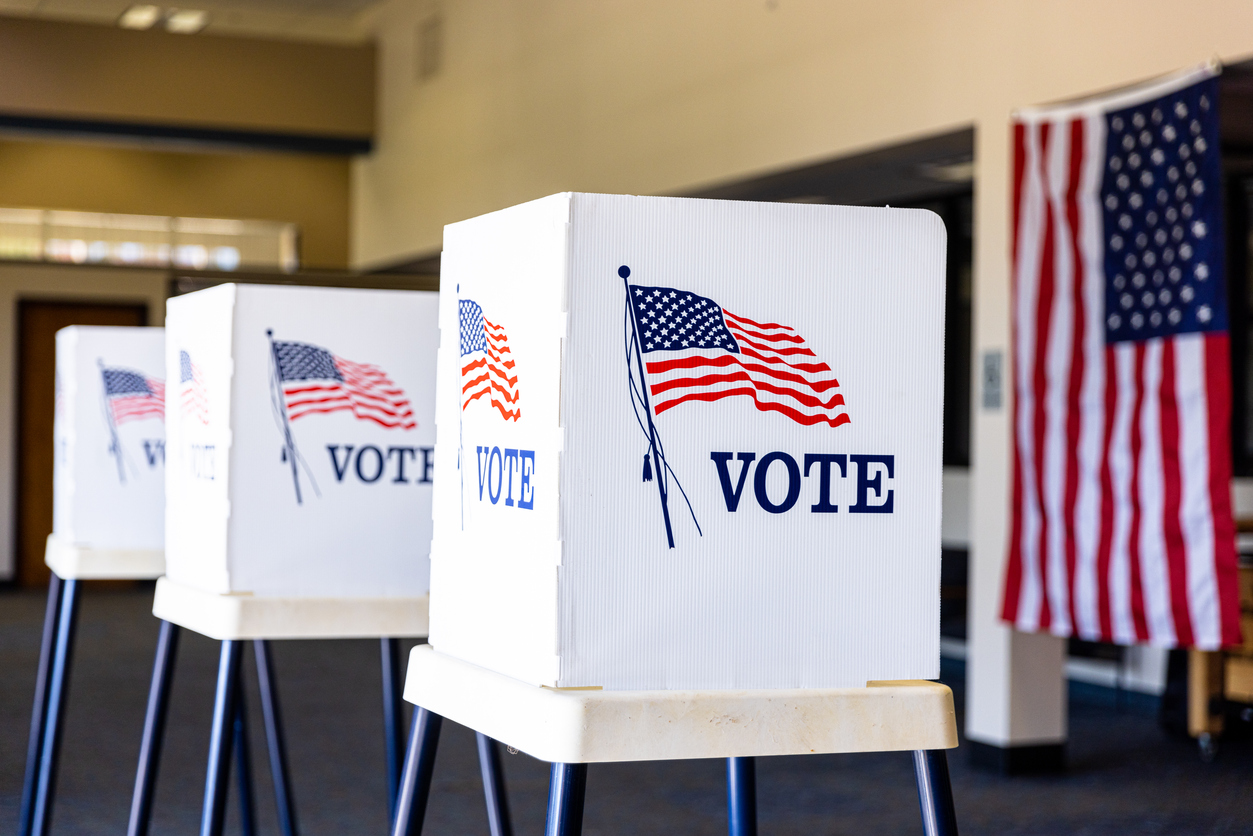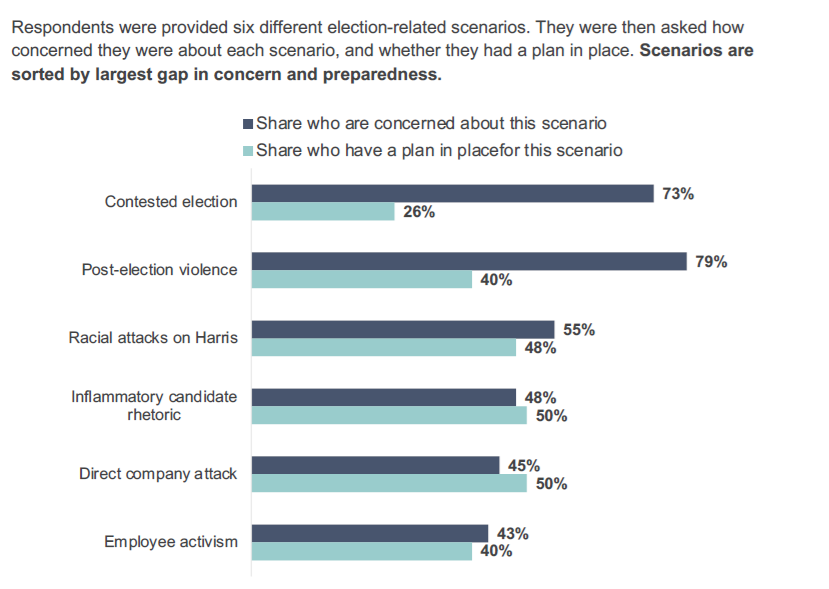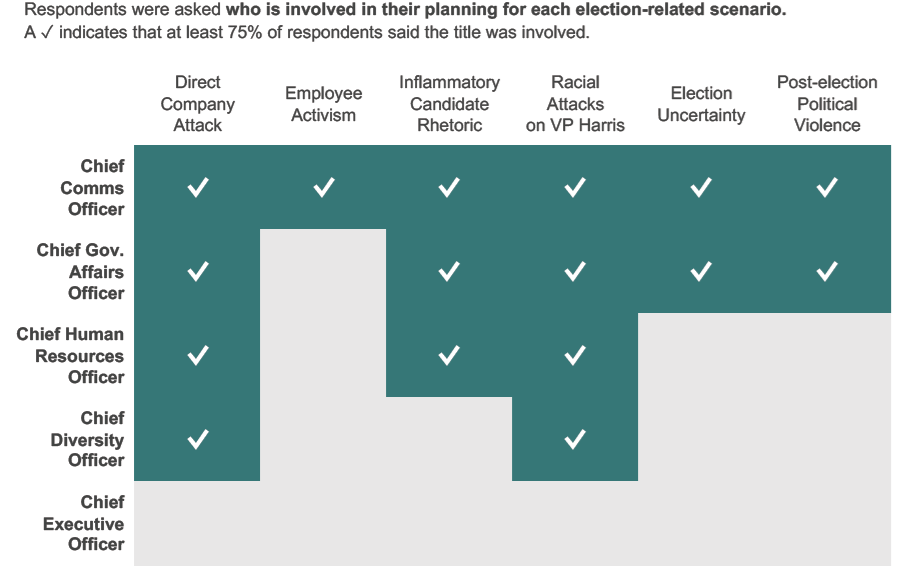By the Numbers: What executives are most worried about in the 2024 elections
Most think they’re prepared — but haven’t made plans in crucial areas.

You might have heard that there’s a little election coming up in the United States in about two months.
The last time Americans went to the polls to pick a president, it ended in days of uncertainty about the winner, a last-minute power grab from the defeated candidate and violence at the U.S. Capitol.
And executives are concerned it could all happen again.
New data from Gravity Research, gathered via interviews and polls with corporate executives, found that 79% of respondents are worried about post-election violence — yet only 40% have a plan to address that scenario. Another 73% are concerned about a contested election, but just 26% of respondents have a plan for possible responses.

Luke Hartig, president of Gravity Research, says at least part of that lack of preparation could be chalked up to businesses feeling that these topics are external to their organizations and not topics they would have to directly address via a communications strategy.
“I think there will absolutely be pressure on companies to weigh in in those types of scenarios, and I think preparing for that right now is a prudent thing to do,” Hartig said. “I’m a little bit surprised that not more companies are doing it, but I totally get the reasoning for it, a lot of them are saying these are sort of external events, and they’re worried more about the things that are going to directly impact them.”
Anecdotally, Hartig said that companies within the Fortune 500 tell him they have taken steps to protect employees, especially those that work in potential flashpoints such as Washington, D.C., by instituting work from home days and other safety measures on election day. However, what many organizations lack is a communications plan to address potential complexities in what could be confusing and contentious moments.
But many organizations are already planning to keep mum if one of the candidates (most likely Donald Trump, who continues to falsely claim the 2020 election was “stolen”) refuses to concede in the election. Fifty-seven percent of organizations said they plan to keep quiet in the event of a contested election. Another 40% are undecided, while only 2% plan to issue a statement.
Even among the 12% of companies who spoke out about the contested election and Jan. 6 insurrection in 2021, 60% said they’ll keep quiet this time around.
This is part of a broader trend of organizations seeking to stay out of politics, even if they’ve been involved in those arenas in the past. One utility executive even noted in an open-ended question that employees are putting increasing pressure on companies to speak out on a variety of issues, which is “out of line with where corporates are.”
Hartig said that employees are not only demanding speech from their companies but they’re also expressing themselves politically at work. Managers are finding themselves in the position of policing small matters of attire — is it OK to wear a Pride pin at work? What about a Palestine pin? Or an Israel flag pin?
“Probably the clearest thing that we’re seeing emerging as companies are thinking about this is training sessions for managers in which they are discussing with their managers how to handle political discussion, how to channel conversations back to the overall mission and intent of the company,” Hartig said.
What executives expect from the election
The data found that, overall, 88% of executives feel at least somewhat prepared for potential chaos around the elections. Consumer staples companies were the most likely to feel very prepared (57%), likely due to their greater pressure from both politicians and the general public. They’re used to feeling the squeeze and know how it might manifest this election season.
Notably, at least 75% of respondents said that their CCO was involved in planning for every election-related crisis scenario — more even than chief government affairs officers. Finally, communications pros are getting a seat at the table — and what an important seat it is amid this unprecedented election.

The shocking shakeup of the Democratic ticket upended not just the political world but also business expectations for the election. Fifty-four percent of respondents marked themselves as “less concerned” about the election since Kamala Harris took over for Joe Biden; just 17% said they were more concerned. However, there was a stark difference between B2B and B2C companies in this regard: 33% of B2B companies were more concerned about the outcome of the race with Harris, compared to just 8% of B2C companies. This could be due to a perception that Harris would continue the Biden administration’s expansion of regulations.
Hartig urges businesses to start planning now, if they haven’t already. Whether that’s planning for civil unrest or a change in the business environment under a new administration, things will certainly change come Nov. 5.
“You’re never going to get it exactly right, but just the process of thinking through some of the ways that that could develop is helpful in building muscle memory, so that when those crises actually do hit, you have a sense of what you’re going to actually do.”
Allison Carter is editor-in-chief of PR Daily. Follow her on Twitter or LinkedIn.







